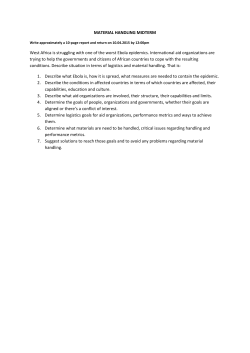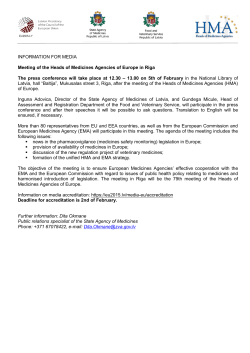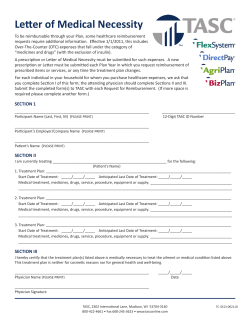
Highlights G-15 Joint Statement
GROUP OF FIFTEEN The Summit Level Group of Developing Countries G-15 Joint Statement to the Sixty-Eighth World Health Assembly Geneva; 18th -26th May 2015 1. I have the honour to deliver this statement on behalf of the Group of Fifteen (G-15), a Summit Level Group of Developing Countries comprising 17 Member States1, aimed for mutually beneficial cooperation and collaboration for realizing sustainable development and economic progress. 2. The emergence of the deadly Ebola outbreak last year demonstrated that health emergencies transcend man made borders and divisions on ‘developing’ and ‘developed’, and highlights the importance of coordinated global efforts to improve health systems at all levels. In this context, we hope that the ongoing work on the reform program within the World Health Organization (WHO) would facilitate in identifying and rectifying the existing implementation gaps to rapidly respond to any future challenges. 3. The Group welcomes the timely discussion in this august assembly, on the theme “Building Resilient Health Systems”, and wishes to re-iterate its call for a coordinated and collaborative multistakeholder action, encompassing national, regional as well as global efforts. While our primary focus should be in building the resilience in national health systems, efforts towards global preparedness for emergencies and disasters are critical. The Group believes that the proposed global health emergency workforce and the contingency fund, would facilitate the WHO and the international partners to better respond to health crises in a more timely manner, and looks forward for a consensus on the modalities of these processes. 4. The model for a strong resilient system should be focused on the integrated health needs of the people at all levels and throughout their life-cycle, young and old, men and women, rural and urban, national and regional etc. In this approach, we note the importance of building effective and inclusive domestic health care systems in the first place, to facilitate the vital initial responses, including through robust dissemination of information on prevention as well as detection and treatment capabilities. The Group also emphasizes the importance of enhancing effectiveness of existing national health systems, particularly by ensuring adequate number of trained health workers, improved infrastructure, availability of quality, safe and affordable medicines and vaccines, reliable health information systems, investment in research and development and most importantly, sound health policies, as a primary responsibility of the State. 5. Fulfilling these key elements of a resilient health system cannot only be fully accomplished by the national efforts, as rightly noted in the UNGA resolution 69/132 ‘Global Health and Foreign Policy’, but requires global engagement, rooted in global solidarity and shared responsibility. In this regard, the Group underscores the importance of North-South, South-South and triangular cooperation as non-exclusive and complementary processes. 1 Algeria, Argentina, Brazil, Chile, Egypt, India, Indonesia, Iran, Jamaica, Kenya, Malaysia, Mexico, Nigeria, Senegal, Sri Lanka, Venezuela and Zimbabwe. 1 6. The Group wishes to highlight the importance of having globally agreed priorities in health related R&Ds, in line with the global health requirements, particularly for the poor and other vulnerable groups and also stress the need to overcome the failures of market dynamics in the production of life – saving medical products. We call the international community to collaborate in building developing countries capacities in order to carry out their own R&D and meet the specific local health needs of these countries. 7. The Group is deeply concerned on the increasing prices of some of the life- saving medical products, affecting the health needs of the people in the Global South as well as, vulnerable segments within the developed countries, as recently demonstrated by new medicines for hepatitis C and cancer. In this context, the Group reiterates the need for urgent international policy space to facilitate equitable access to affordable, quality, safe and efficacious medicines. 8. The Group underscores that the public health needs of the developing countries will be best served if full use of the flexibilities available under the WTO TRIPS Agreement, including the Doha Declaration on the TRIPS Agreement and Public Health are respected, made available and implemented. 9. The Group also express concern on the threats posed by increasing resistance to antimicrobial drugs and recalls that the challenge of combating antimicrobial resistance cannot be addressed by any country, or a region, alone. In this regard, there is an urgent need for collective action to ensure responsible use of antimicrobials as well as to strengthen antimicrobial stewardship and infection prevention and control, particularly in countries with limited resources and vulnerable healthcare systems. 10. The Group closely follows the ongoing negotiation on the post – 2015 development agenda, and believes that health and development must remain core principles of the agenda. 11. The Group is also concerned on the challenges of non-communicable diseases (NCDs), and underscores the importance of comprehensive multistakeholder strategies to address these challenges. On the neglected tropical diseases, the Group encourage the continued prioritization of these diseases in national as well as global health agendas, in order to prevent any conceivable catastrophes. 12. Finally the Group wishes to reiterate its firm recognition of WHO’s leading role in shaping global health policies and in engaging and coordinating global health partners. We note the commitments as outlined in the ‘WHO Statement on the Ebola Response and WHO Reforms’ undertaken by the Director General and the Staff of the WHO, and hope that these commitments will be transpired in to action, enabling the WHO to emerge more effectively and stronger to be able to fulfill its mandate as the leading global health authority, for improved health outcomes. Thank you. 2
© Copyright 2025





















